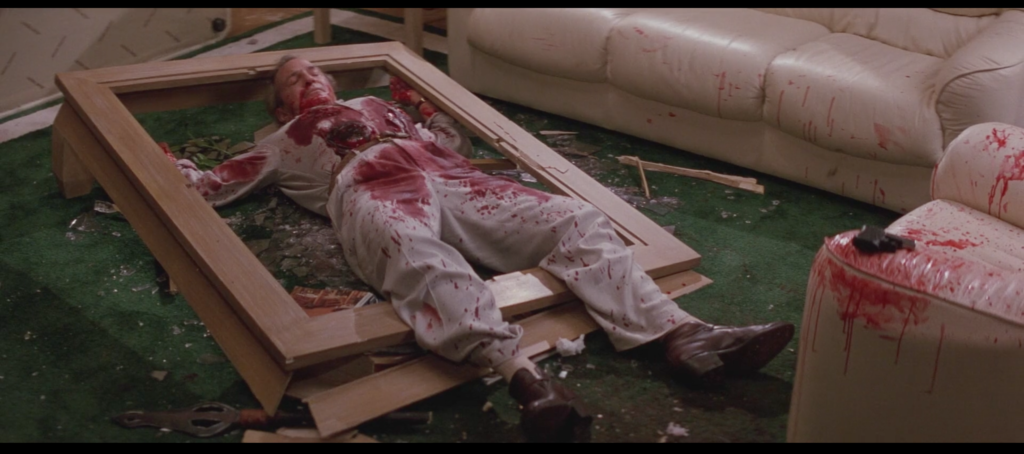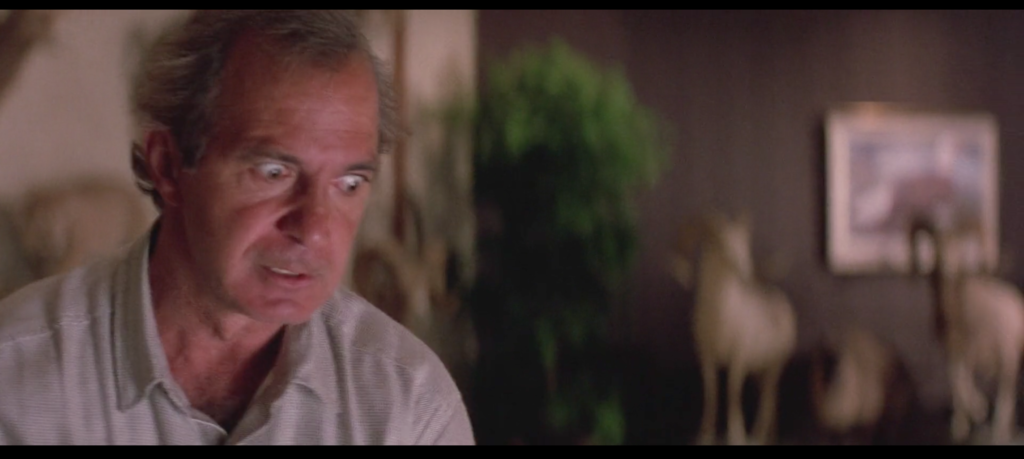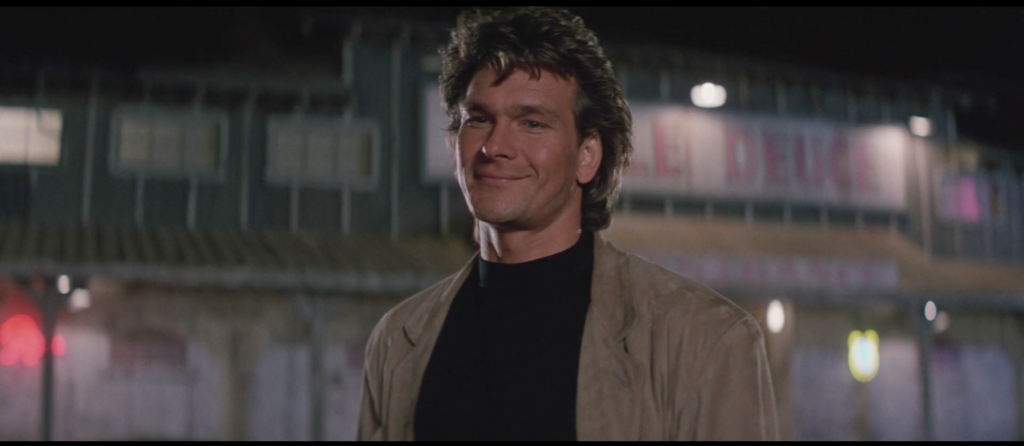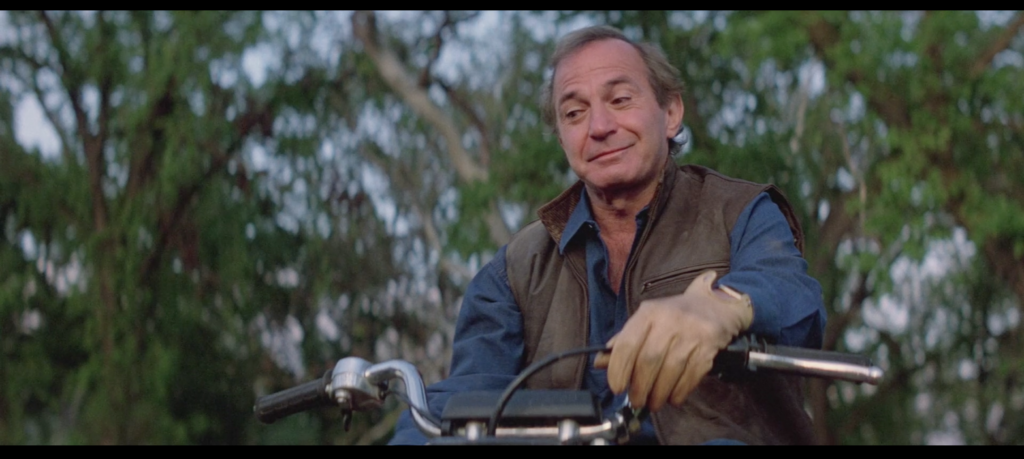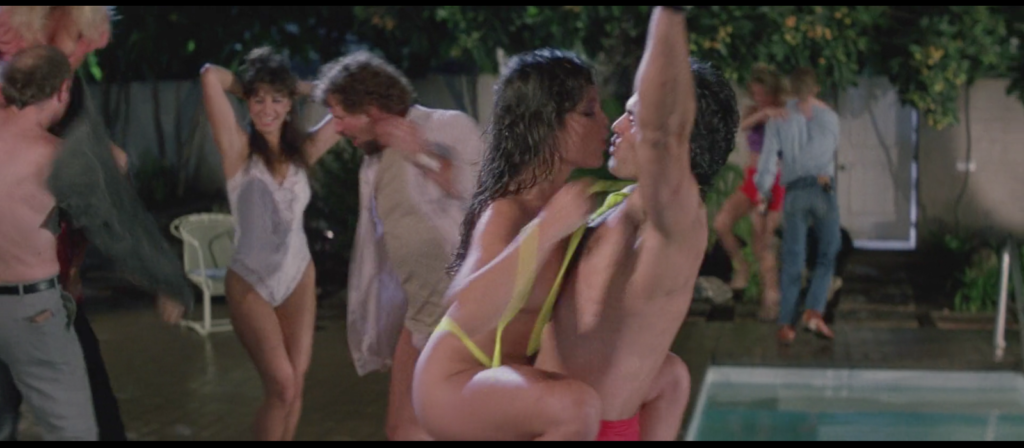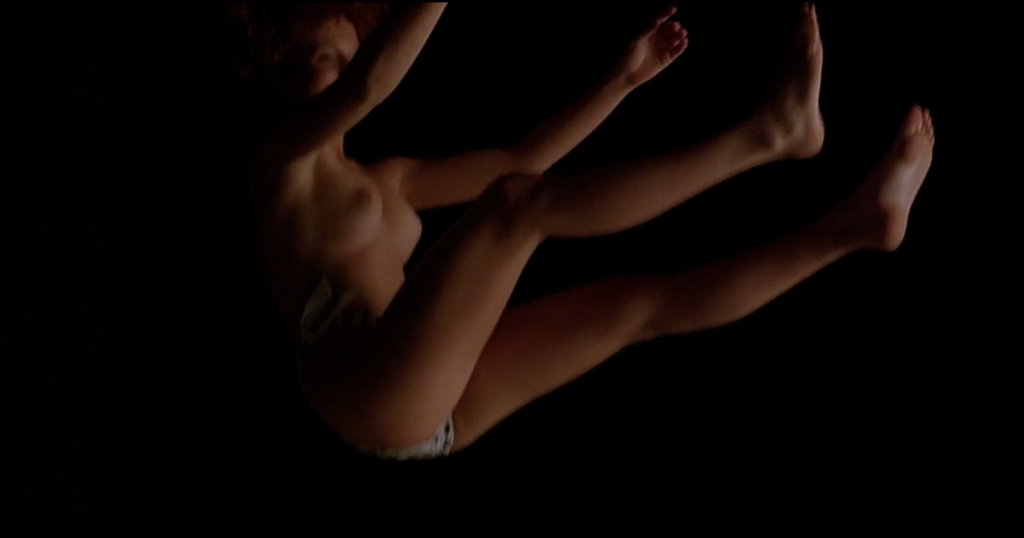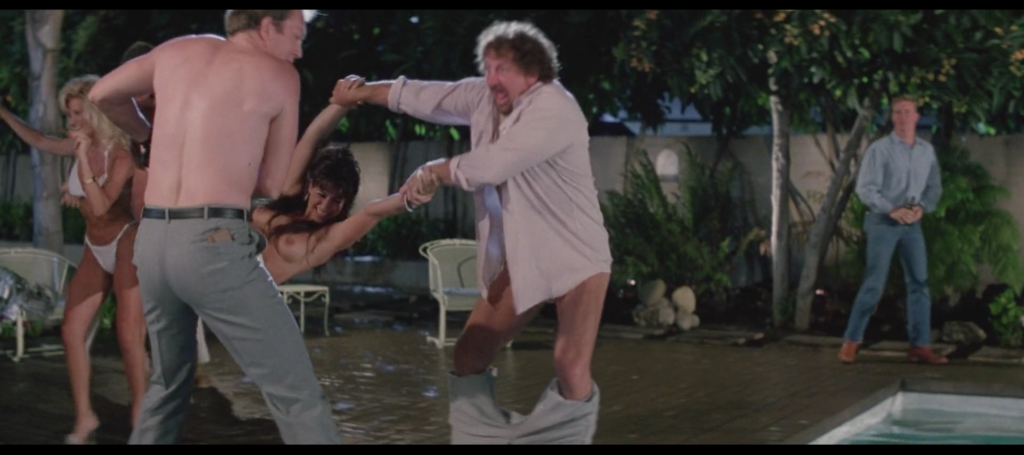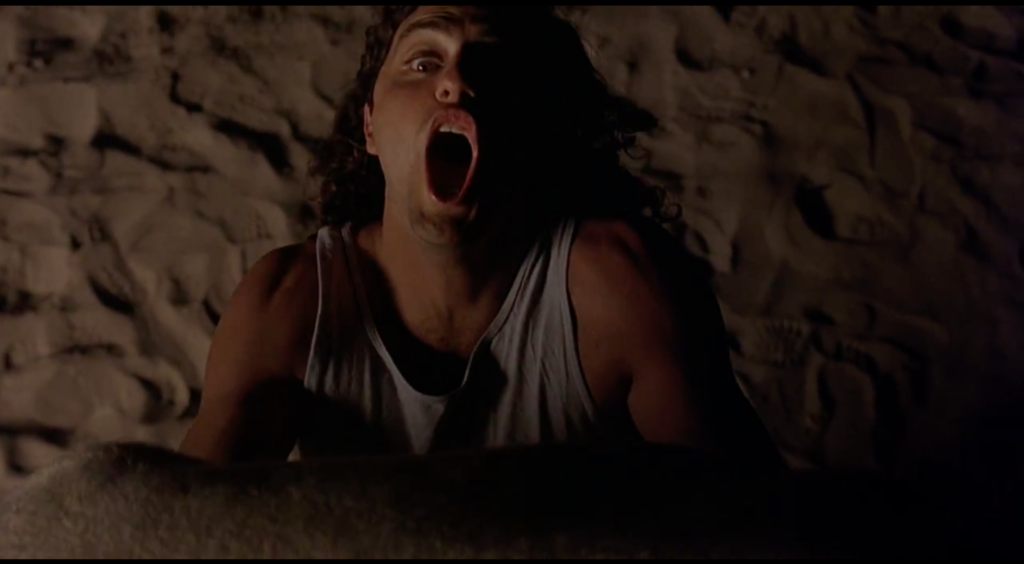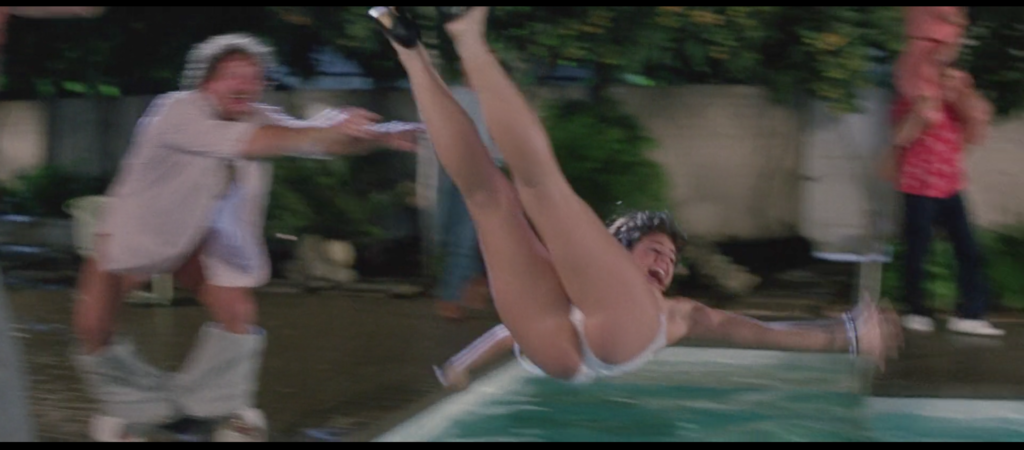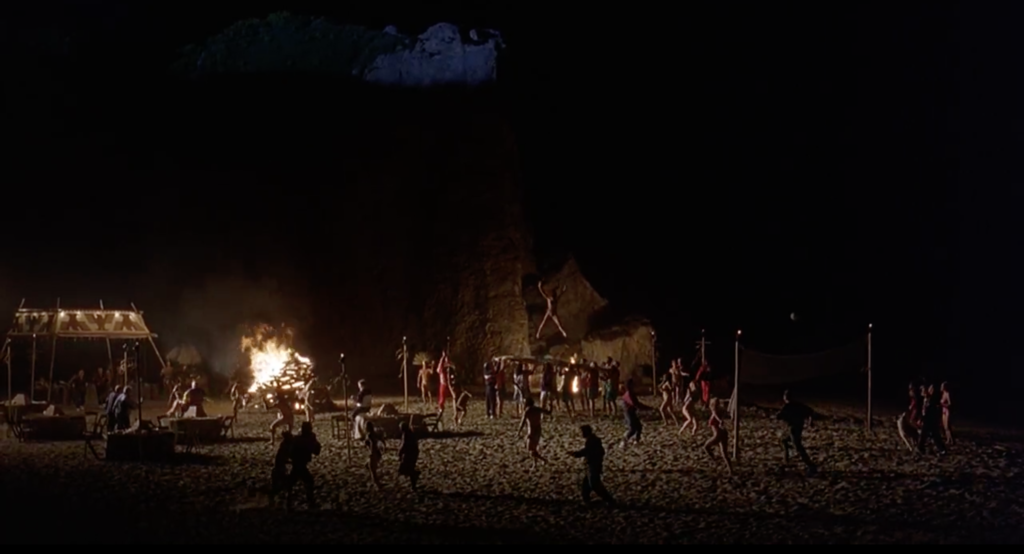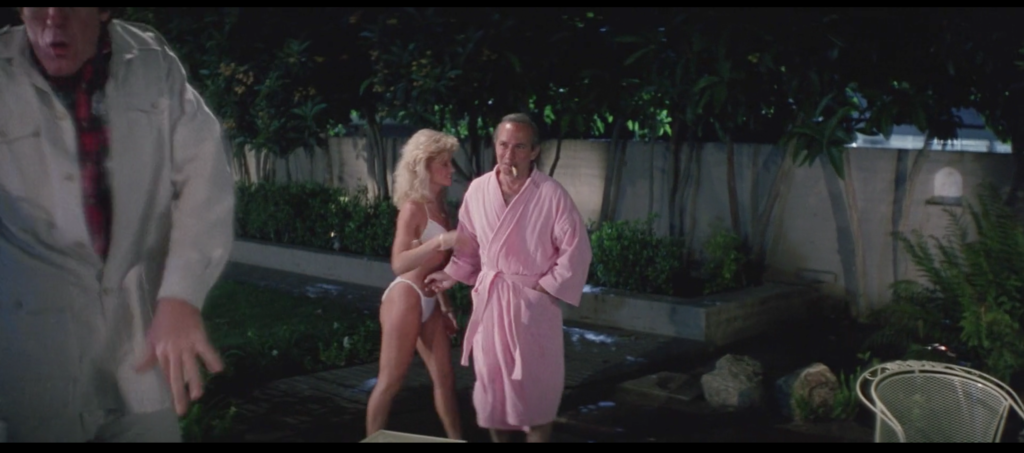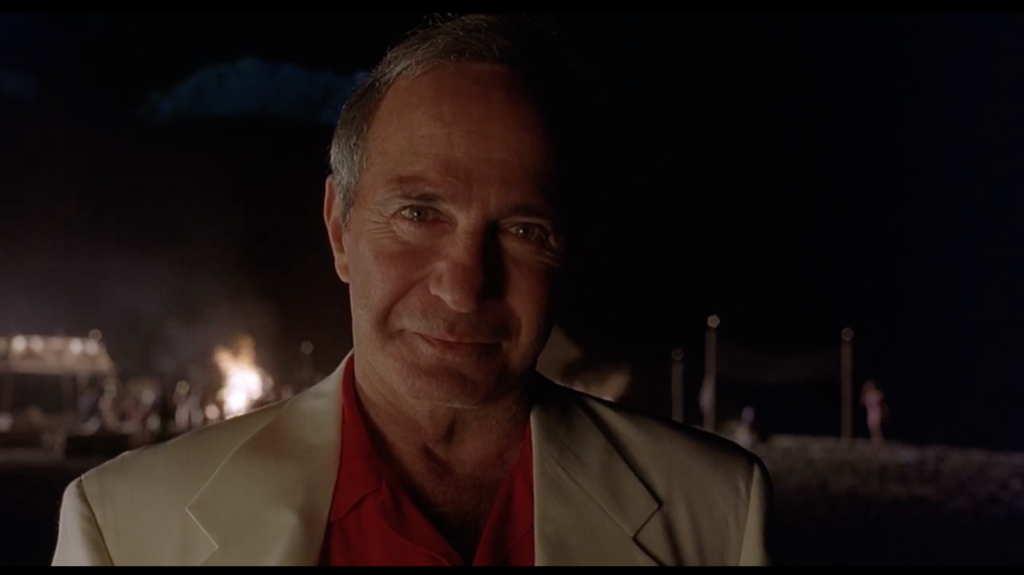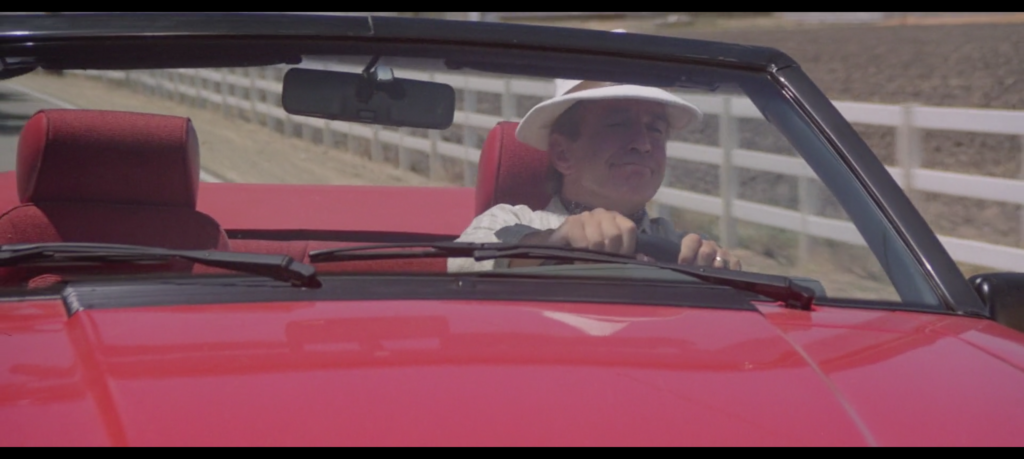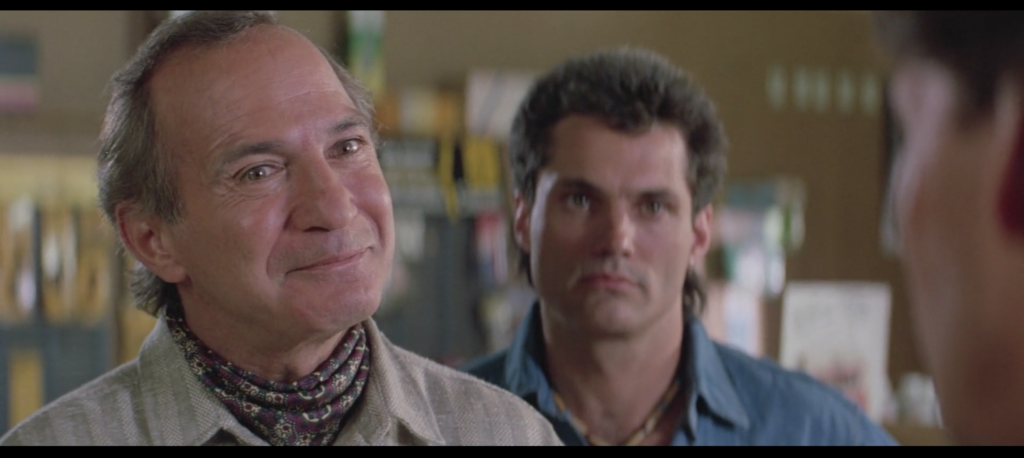Posts Tagged ‘ben gazzara’
350. Dead Brad
December 16, 2019Here lies Brad Wesley.
Some thoughts:
- “Look how they massacred my boy.”
- The way the ruins of the coffee table frame his body, like a portrait in a picture frame, reminds me of his exchange with Dalton over the picture of his grandfather: “Looks like an important man.” “He was an asshole.” The apple doesn’t die far from the tree.
- I don’t think we’ve adequately discussed how willfully bizarre it is to have this little living-room set right in the middle of dozens, possibly hundreds, of stuffed and mounted animals killed on safari. Can you imagine coming over to Wesley’s house for, I don’t know, a Christmas party or a football game, and he invites you to sit amid the carcasses and make merry with him? “I see you’ve found my trophy room. The only thing that’s missing…is your ass…on my sofa! Have a seat, make yourself at home. You want anything? Have a bloody mary? Some breakfast? At least let me get you some coffee. Oh, that? That’s a water buffalo I shot to death. Milk and sugar? You take it black?”
- The good news is that the blood should come right off of that naugahyde.
- Next to Wesley’s right leg you can see one of the magazines he had on his coffee table before he was shot four times and sent flying through it. I can’t stop thinking about it. Did he while away an afternoon flipping through it earlier that week, not knowing it would one day soon rest beneath his corpse? Or was it just for show, or for company? Do you think Brad Wesley was much of a reader?
- Ben Gazzara was a hell of a sport, getting wired with that many squibs. If they’d gone off all at once he’d have exploded like a smashed watermelon.
- The question of Brad Wesley’s will was not one I’d entertained until this very moment. With most of his close associates, including his sister-son Pat McGurn and his bastard son (never officially acknowledged or legitimated) Jimmy Reno, dead, who would his worldly belongings and fortune go to? Could his “Jasper Improvement Society” protection racket now become a legit fund for civic development?
- His battered girlfriend Denise deserves the money, that much I can say. In my mind I’ve written a happy ending for her where she tricked the old bastard into signing a document leaving everything to her without reading it over, like she said it was a release form for her Jazzercise class or something, and she gets to take over his mansion and his money and his interest in the 7-Eleven and live happily ever after. The dead animals would be the first things to go.
- Goodbye, Brad Wesley. You were a truly demented person and a one-in-a-million movie villain. I’ll miss you, and I hope they have JC Penneys in hell.
342. Mad Brad
December 8, 2019In the middle of whipping the shit out of Dalton with a spear, Brad Wesley makes this face. His eyes all but bug right out of his head. His mouth is set in some sort of weird battle rictus. His usually impeccably coiffed hair is just wild enough to look upsetting in context. All in all it’s probably the right way to look if you are Ben Gazzara, age 58, and you’re supposed to be a convincingly formidable adversary to a trained dancer/fighter/stuntman/actor 22 years your junior. Fortunately for us, director Rowdy Herrington agreed, and a lingering shot of this absurd face made the cut when this fight scene was put into its final form. It goes a long way toward selling Wesley’s end of the bargain.
For his part, Patrick Swayze spends a long time just dodging rather than striking, rolling around on the furniture, avoiding Gazzara’s swipes and stabs with the spear. When he finally gets back on his feet he’s hunched over, his bullet-wounded left arm pulled in toward his body, a posture that conveys the fact that he’s badly injured and possibly also just worn down from murdering four other guys in the past three or four minutes. After seeing Dalton go toe to toe with the likes of Jimmy and emerge victorious, Road House had yeoman’s work to do in order to convince us that Dalton’s battle against Brad Wesley would be anything other than an embarrassing squash, and by god the film almost pulls it off.
109. We’re not so different, you and I
April 19, 2019“What he says, goes.” “It’s my way or the highway.” “It’ll get worse before it gets better.” Few action-movie cliches go unuttered in Road House, along with several no action movie has ever used before or since. (“I sure ain’t gonna show you my dick.”) Remarkably, however, we never get a good “We’re not so different, you and I” out of Brad Wesley. There are moments when it seems he’s coming close—Mike Nelson notes this during the climax in his excellent solo RiffTrax on the movie, the first of three or four he and the other MST3K vets have recorded—and the Doc draws the parallel herself when things get really hairy, but the villain whose specialties are taunting Dalton and opening JC Penneys never goes there.
Given Rowdy Herrington’s direction, perhaps actually coming out and saying it would be gilding the lily. No, no one says “We’re not so different, you and I.” But in scene after scene both Dalton and especially Wesley react to annoyances and misfortunes with the exact same way. They cock their head to the side, shake it in “get a load of this” disbelief, and half-smile “ya just gotta laugh”–style. Dalton does it when he emerges from the Double Deuce after his first night of work and discovers his car has four flat tires, a broken antenna, and a shattered windshield (Nelson, in his RiffTrax again: “I have hours of backbreaking labor ahead of me. It’s actually pretty funny!”); Wesley does it the very next day when he spots Dalton practicing tai chi. You get variations on it for matters as minor (no pun intended) as Dalton finding Steve in flagrante with a young lady in the back room, and as grave as Wesley walking through his mansion and discovering the dead bodies of all his henchmen. Wade Garrett and Elizabeth may not do the head-shake thing but they spend the entirety of their three-person date with Dalton grinning at each other in that same can-you-believe-it way.
It can hardly be said that Ben Gazzara and Patrick Swayze have similar acting styles or training, so I can only assume this was Harrington’s go-to instruction, like George Lucas’s infamous “faster, more intense” on the set of Star Wars. But like so many of the film’s other foibles this winds up feeling both endearing and unique. Vandalism, tai chi, dead bodies, people fucking during their 15 minutes—Road House‘s reaction to each is “grin and bear it,” and there’s no other film with quite so untroubled an outlook on the totality of human experience. As Red Webster put it, “That’s life. Who can explain it.”
073. Lebowski II: Garden Parties (continued)
March 14, 2019Road House is a 1989 film in which a shady business mogul played by Ben Gazzara flouts decency standards in a waterfront community that he controls through a combination of extravagant wealth and muscular morons. The Big Lebowski is a 1998 film in which Gazzara reprises this role.
The two orgiastic parties thrown by the Gazzara characters in these movies, Malibu pornographer Jackie Treehorn in the latter and Jasper JC Penney enthusiast Brad Wesley in the latter, have so many surface-level similarities it remains difficult for me to believe that Joel and Ethan Coen were not familiar with Rowdy Herrington’s masterpiece when they made their own. Smiling men tossing topless women through the air, the bright blue of a pool juxtaposed against the dark of the night, a general “the night time is the right time” atmosphere, the dramatic entrance of the Gazzara characters themselves, goons—it’s all there.
Yet the differences reveal much, as they typically do, even as they point to how similarly the two films often function. I vividly remember going to see Lebowski at the movie theater when it debuted and finding it a sensational film, in the sense that on a scene-by-scene basis I felt buffeted by new and unprecedented forms of ridiculousness. The Treehorn beach party is way way up there on the list, beginning as it does with a topless woman plummeting through a void with the otherworldly voice of Yma Sumac blasting at full volume. This is the impression Treehorn wished to make on the Dude as well, whom he used his goons to summon to his estate, impressed with the excess and splendor of his lifestyle, lulled into a false sense of security, drugged, and dumped in the street. It was a party for himself and his, I dunno, friends I guess?, but it was also a performance for one Jeffrey Lebowski. Treehorn’s direct-address introduction of himself right into the camera speaks to that.
Brad Wesley’s idiotically raunchy shindig has no such purpose. He and his men and women have no idea Dalton is watching from across the river; indeed it’s unclear if at this point in the film Wesley has any idea where he lives at all, and furthermore Dalton makes an effort to hide his observation of the party by switching off the light by which he was reading a Jim Harrison novel when the noise of the soiree first distracted him. Additionally there is nothing particularly disorienting or otherworldly about this parade of gawping meatheads and Mötley Crüe video extras—they simply run out of Wesley’s house in a surprisingly orderly line, start stripping off their clothes (“hot babe” bikinis for the women, the usual thug-casual style for the goons), and boogie down to Bob Seger’s “Monday Morning” of all things. Wesley arrives last but he incorporates himself into the festivities rather than set himself apart, joining his girlfriend Denise and pinching the cheek of Mountain, his tallest and goofiest goon. Where the Dude is duly impressed by Treehorn’s milieu (“Completely unspoiled!”), Dalton is merely amused by Wesley’s, a fair and perhaps even generous reaction to a party at which a central component is Terry Funk with his pants around his ankles.
The point I’m trying to make is that while the Ben Gazzara party scene in The Big Lebowski serves a concrete purpose for the Ben Gazzara character, the Ben Gazzara party scene in Road House exists simply to entertain an audience the film presumes to be pretty stupid, or at least open to enjoying pretty stupid things. Dalton, a man of diverse interests, enjoys it just fine. Thus Wesley’s power to impress and intimidate Dalton with his Dionysian powers is dissipated. When he finally does attempt to bowl the cooler over with demonstrative partying and sexuality deep into the film, when he has Denise strip at the Double Deuce as a show of masculine force, Dalton is completely impervious. This party is a vaccine.
072. Lebowski II: Garden Parties
March 13, 2019032. Sh-Boom
February 1, 2019Originally recorded by doo-wop group the Chords, who charted with it in 1954, “Sh-Boom” became part of the pop-culture firmament largely because of a cover version by the Crew Cuts that was also a hit later that year. Both versions are the kind of gleeful pure-dee nonsense that make doo-wop such a fun genre to pronounce, let alone listen to. While Chords’ rendition has a jaunty swing to it, the Crew Cuts’ whitebread revamp emphasizes the gliding, carefree, “life could be a dream” side of the song. It sounds like a Sunday drive.
Of course, most people content themselves with driving on the right side of the road, Sunday or any other day, whether they’re listening to “Sh-Boom” or “Yakety Yak” or “Symphony of Destruction” by Megadeth. This is not just because it’s the law, or because it’s much safer not to drive into oncoming traffic. It’s because staying in your lane allows you to chart a long straight course, and a long straight road is the most fun kind to drive. The Germans modeled a whole genre of music after it and everything.
When we see Brad Wesley driving his red convertible (a Ford, possibly ill-gotten from Strodenmire’s ill-fated Ford dealership) with the top down on a bright sunny day, the fact that he’s singing “Sh-Boom” fits. It’s that kind of song. Wesley is also swerving from one side of the road to the other and back, over and over, like a sine wave, like a snake. This, too, fits. He’s that kind of person. But the actual driving process deserves closer examination.
Until Dalton passes by headed in the other direction, nearly getting run off the road in the process, there isn’t another car in sight. Wesley has the road all to himself. He could comfortably cruise along, taking in the air and the scenery. He could floor it if he felt the need for speed. (“He’s go the sheriff and the whole police force in his pocket,” Red Webster tells Dalton later in the film; the line is likely intended to explain why crimefighting in Jasper is entirely the province of bouncers, but it explains a lot of other things too.) This is what normal people who enjoy a nice drive would do.
As anyone who’s whipped around an empty high-school parking lot could tell you, rocking the steering wheel back and forth like Wesley does creates a push-pull swerving sensation that’s much more enjoyable in theory than in practice. If you’re a 17 year old looking for a quick thrill when you’re all out of kratom or whatever, sure knock yourself out. But to drive that way over a significant distance is less fun than just driving straight, not more.
Ben Gazzara sells the nauseating joyride as well as you’d expect from an actor who, prior to Road House, created the role of Brick in Cat in a Hot Tin Roof by Tennessee Williams. And indeed we can take Wesley’s glee as entirely sincere, but not because he’s having fun driving in and of itself. He has gone out of his way to make his drive less physically enjoyable, because the thrill of being a gigantic asshole and recklessly endangering the lives of others more than compensates for the loss.
This is the kind of man Brad Wesley is. He can hey-nonny-ding-dong-alang-alang-alang his way back and forth across every inch of asphalt in Jasper and none can say him nay. That’s worth a crick in the neck.
002. Brad
January 2, 2019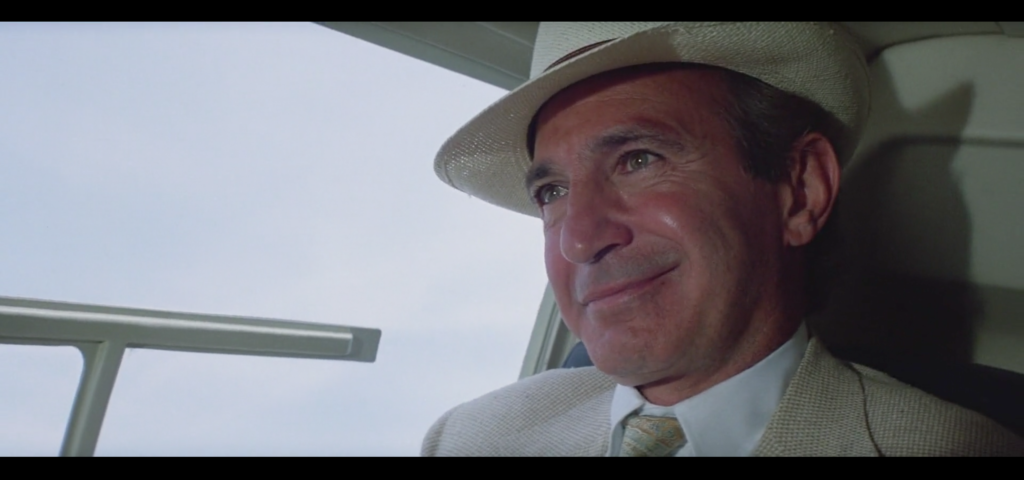 Here’s what we know about Brad Wesley.
Here’s what we know about Brad Wesley.
He grew up on the streets of Chicago, where he “came up the hard way.”
He came to Jasper, Missouri after serving in the Korean War.
His grandfather was an asshole.
He has one sister, whom we don’t meet.
He has a nephew, Double Deuce bartender Pat McGurn, whom we do.
He has a cousin in Memphis. (This unseen—or is he?—cousin tells him Dalton killed a man down there. Said it was self defense, which Brad doubts.)
He owns a helicopter, an ATV, a red convertible, and a monster truck, all of which he enjoys driving, or paying someone else to drive, erratically.
He loves the song “Sh-Boom.” (The Crew Cuts version, not the Chords version, which if you know Brad is unsurprising.) He can’t stand today’s music, which has “got no heart.” He prefers when bands “play something with balls.”
He employs a squad of goons for whom he enjoys throwing topless poolside bacchanals, and whom he also enjoys beating up arbitrarily when they displease him for reasons such as bleeding too much.
His favorite goon is Jimmy, a martial artist who I believe to be his bastard son. Strictly speaking this is not supported by the text—Wesley refers to all of his goons as “my boys”—but it’s in the eyes.
He’s “dating” a woman named Denise, whom he beats up for coming on to our hero Dalton. Later he has her do an erotic striptease at the Double Deuce to teach Dalton a lesson (?).
He used to be married to Dr. Elizabeth Clay, a surgeon or gastroenterologist with whom Dalton becomes involved after she treats him for several wounds incurred in his first barfight at the Double Deuce.
He lives in a waterfront mansion across a lake or river or something from the farm or ranch or whatever where Dalton rents an extravagantly appointed open-air apartment from a bearded old codger named Emmet who sleeps in a union suit. This provides him with a convenient vantage point from which to buzz the old man’s horses with his chopper or sit in a rocking chair and watch Dalton and Elizabeth have sex on the roof of a barn.
Now’s a good time to mention he’s played by Ben Gazzara, a frequent collaborator of John Cassavetes who created the role of Brick in the original Broadway production of Tennessee Williams’s Cat on a Hot Tin Roof.
He alternates between light-colored suits of the Boss Hogg variety and the fussily sporty apparel of a weekend warrior. As they do in the wardrobes of many characters in this film, boots play a disproportionately large role in his ensembles.
He has a trophy room full of the stuffed carcasses and mounted heads of both exotic and domestic animals that would shame a Trump son.
He runs a glorified protection racket called the Jasper Improvement Society that keeps all the local businesses under his thumb, including the auto parts store run by Elizabeth’s uncle Red Webster.
He controls alcohol distribution in the region, which provides him with a line of attack on the Double Deuce after his nephew Jimmy is fired for skimming the till.
He feels that his many achievements in building the town of Jasper up from “nothing” have entitled him to get rich off its inhabitants.
Here are those achievements, quoted verbatim.
I brought the mall here. I got the 7-Eleven. I got the Fotomat here. Christ, JC Penney is coming here because of me! You ask anybody, they’ll tell you!
Road House is the story of one bouncer’s quest to free a small town from the iron fist of the guy who is on the verge of opening the area’s first JC Penney. Over half a dozen men will die for this.

